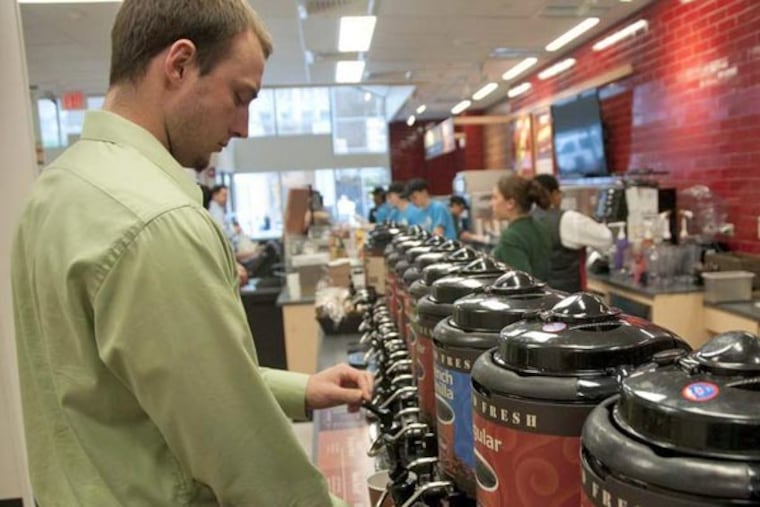Wawa vs. Sheetz: Fast-food chains mark their own territories
Pennsylvania divides a few ways: Phillies vs. Pirates. Democratic ex-factory towns vs. Republican ex-farming townships. Nittany Lions fans vs. everyone else.

Pennsylvania divides a few ways: Phillies vs. Pirates. Democratic ex-factory towns vs. Republican ex-farming townships. Nittany Lions fans vs. everyone else.
And Wawa vs. Sheetz - though that might be the least bitter rivalry: The state's two big gas-and-milk, Cokes-and-smokes, Tastykakes-and-store-built sandwich chains try not to fight. They're not like Ford vs. GM. Instead, they have mostly drawn lines and split the land between them. Like Comcast and TimeWarner Cable.
Which you prefer depends on where you were raised:
Wawa is Philly and the Shore from Jersey to Virginia Beach. Also Florida, since last year.
Sheetz is Pittsburgh and the valley highways below the green ridges, all the way to Greensboro, N.C.
There's a family resemblance that dates to when the Wood dairy farm in Wawa, west of Philly, and the Sheetz dairy farm near Altoona, east of Pittsburgh, traded wagons for motor truck delivery at the dawn of the 1900s.
The markets grew up after World War II. Sheetzes still run Sheetz; Woods still own a chunk of Wawa, though veteran workers now own more, through a retirement plan that's become a Wawa recruiting tool.
But they are also easy to tell apart:
Sheetz is fire-truck red, the color to wake you up and inspire you to buy warm, fatty sandwiches while fueling your day on the road.
Wawa is beige and white, colors to ease your stress, since you already know you want coffee, gas, and something meaty-bready. The idea is to make the transaction painless, even pleasant.
"You want me to talk smack about Wawa?" asks Lou Sheetz, executive vice president and a third-generation boss. "I never have. We have a very equal product. What they produce in fresh food, fresh coffee, their commitment to taste and quality, is equal to ours. The gasoline is of the same quality. Their commitment to price point, their commitment to well-trained people . . ."
It all balances, Sheetz insists.
Wawa added stores last year in Tampa and Orlando. Why not Harrisburg or someplace closer? "Go west, we're in Sheetz country," Wawa's then-chief executive, Howard Stoeckel, said at the time. "Sheetz is like us. We respect them. That's why we leapfrogged to Florida. That's an underserved market."
Sheetz misses the days when his dad and uncles called on the Wawa Woods.
"We learned a lot together about the coffee business," he recalls. "We learned a lot from them on the deli business. They learned a lot from us on the gasoline business. We used to visit. We used to pick up the phone and chat."
But in the 1990s, Wawa and Sheetz started converging, in a few towns like Bethlehem, Reading, and Ephrata, on the border of Italian-inflected Greater Philadelphia and German-legacy upstate Pennsylvania, and "we realized we can't have these conversations anymore," Sheetz said.
Now, there are more than 600 Wawas and 440 Sheetzes, in great parallel clusters, spreading south.
There are business differences: Wawa pushes produce. Sheetz owns its food factory. Wawa works closely with Amoroso's, J&J Snack Foods, and other partners. Sheetz, with its slightly more rural-truckstop vibe, has added outdoor seats, and doesn't so much mind if some customers park 20 minutes. Wawa expects them to be in and out in more like five.
Both chains aspire to be seen as casual dining outlets - Applebee's to go. But whose favorite sandwich comes from a chain store?
"You never lose the special appeal of your favorite sandwich shop - every community has one," Lou Sheetz admits. "But for most people, those are reserved for special occasions. I would guess the number of sandwiches we make are greater than all the sandwich shops. We're handy. We're on the way."